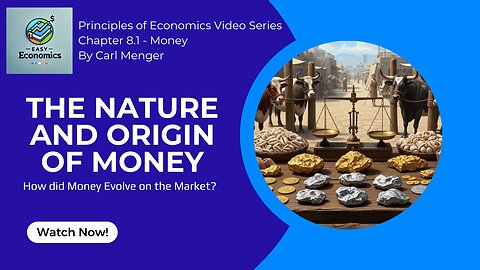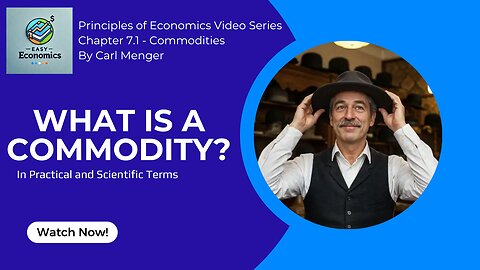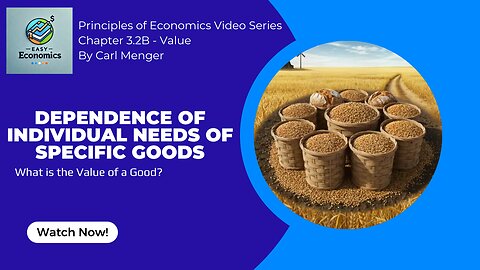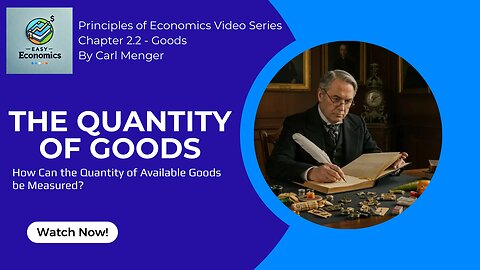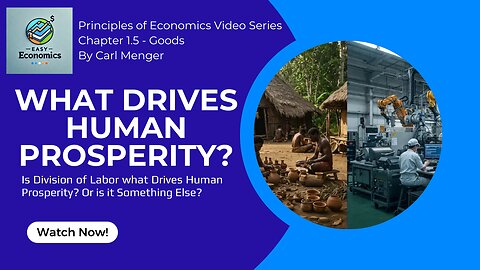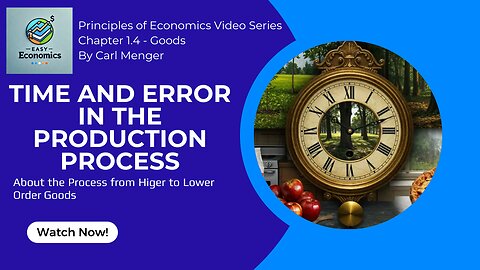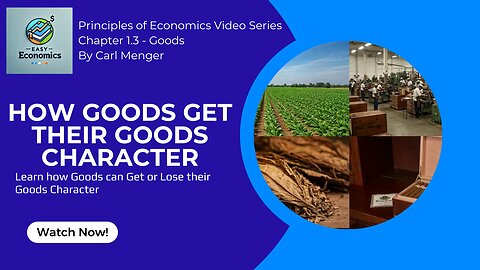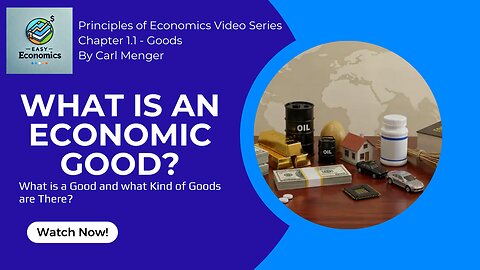Premium Only Content

Principles of Economics by Carl Menger Chapter 8.1 - The Nature and Origin of Money
Principles of Economics by Carl Menger Chapter 7.2C - Circulability of Commodities
Principles of Economics by Carl Menger Chapter 7.2B - Differences in Marketability of Commodities
Principles of Economics by Carl Menger Chapter 7.2A - Marketability of Commodities
Principles of Economics by Carl Menger Chapter 7.1 - What is a Commodity?
Principles of Economics by Carl Menger Chapter 5.3C - Competition Policy
Principles of Economics by Carl Menger Chapter 5.3B - Price Formation by Competing Sellers
Principles of Economics by Carl Menger Chapter 5.3A - Price Forming and Distribution by Competition
Principles of Economics by Carl Menger Chapter 5.2D - Principles of Monopoly Trade
Principles of Economics by Carl Menger Chapter 5.2C - Market Dynamics of Monopoly Pricing
Principles of Economics by Carl Menger Chapter 5.2B - Price Forming in Monopoly Trade for Quantities
Principles of Economics by Carl Menger Chapter 5.2A - Price Formation in Monopoly Trade
Principles of Economics by Carl Menger Chapter 5.1 - Price Formation in Isolated Exchange
Principles of Economics by Carl Menger Chapter 5.0 - The Theory of Price
Principles of Economics by Carl Menger Chapter 4.2 - The Limits of Economic Exchange
Principles of Economics by Carl Menger Chapter 4.1 - Foundations of Economic Exchange
Principles of Economics by Carl Menger Chapter 3.3E - The Value of Land, Labour and Capital
Principles of Economics by Carl Menger Chapter 3.3D - The Value of Individual Higher Order Goods
Principles of Economics by Carl Menger Chapter 3.3C - Combined Value of Higher Order Goods
Principles of Economics by Carl Menger Chapter 3.3B - The Productivity of Capital
Principles of Economics by Carl Menger Chapter 3.3A - What Causes the Value of Higher Order Goods?
Principles of Economics by Carl Menger Chapter 3.2D - The Subjective Nature of the Measure of Value
Principles of Economics by Carl Menger Chapter 3.2C - Influence of the Quality of Goods on Value
Principles of Economics by Carl Menger Chapter 3 2B - The Value of Goods for Individual Needs
Principles of Economics by Carl Menger Chapter 3.2A - Difference in Importance for Individual Needs
Principles of Economics by Carl Menger Chapter 3.1 - The Theory of Value
Principles of Economics by Carl Menger Chapter 2.4 - What is Wealth?
Principles of Economics by Carl Menger Chapter 2.3 - Human Economy and Economic Goods
Principles of Economics by Carl Menger Chapter 2.2 - Available Quantities of Goods
Principles of Economics by Carl Menger Chapter 2.1 - Human Requirements in Economics
Principles of Economics by Carl Menger Chapter 2.0 - Economy and Economic Goods
Principles of Economics by Carl Menger Chapter 1.6 - Ownership of Goods
Principles of Economics by Carl Menger Chapter 1.5 - Causes of Human Prosperity
Principles of Economics by Carl Menger Chapter 1.4 -Time and Error in the Production Process
Principles of Economics by Carl Menger Chapter 1.3 - The Laws that Govern Goods Character
Principles of Economics by Carl Menger Chapter 1.2 - The Causal Connection Between Goods
Principles of Economics by Carl Menger Chapter 1.1 - The Nature of Goods
Principles of Economics by Carl Menger Chapter 3.1 - The Theory of Value
You want to read the book? Get it here: https://amzn.to/4cCPIQs
Watch the next video in this series: https://rumble.com/v6sl3v5-principles-of-economics-by-carl-menger-chapter-3.2a-difference-in-importanc.html
Watch the video series from the start: https://rumble.com/playlists/I48mBTB4w2c
Watch our video about Carl Menger: https://rumble.com/v61z0l2-carl-menger-the-father-of-austrian-economics-and-subjective-value.html
What gives something value? Is it usefulness, rarity, or something else entirely? In this video, we explore The Theory of Value through the insights of Carl Menger and Austrian Economics. You’ll discover that value doesn’t come from the good itself—it comes from human needs and the awareness of scarcity.
A good becomes valuable when people recognize they depend on it to meet their needs—and when there’s not enough to satisfy everyone. If a resource is abundant, like air or river water, it may be useful but holds no value. Why? Because losing some of it doesn’t impact anyone’s well-being. But when supply drops below demand, every unit suddenly matters. That’s when value appears.
We’ll also clear up a common confusion in economics: usefulness or utility is not the same as value. Many goods are useful, but only scarce goods are truly valuable. This distinction is key to understanding how people act in markets and daily life.
Value isn’t fixed, objective, or inherent in goods—it exists only in the minds of individuals based on their situation. When needs change or supply shifts, value can appear or disappear overnight.
If you’ve ever wondered why some things are priceless in one situation and worthless in another, or why economists talk about “subjective value,” this video will give you clear answers.
Questions Answered in This Content
-What is value in economic terms?
-How does scarcity create value?
-Why don’t abundant goods have value?
-What’s the difference between usefulness or utility and value?
-Can value change over time or place?
-Why is value considered subjective in Austrian Economics?
-How does awareness of scarcity influence human behavior?
-Why do some economists confuse use value and exchange value?
-Does value exist independently of human judgment?
-How can people assign imaginary value to useless things?
00:00 - Introduction to the Theory of Value
00:11 - Economic Activity and Value
00:52 - Scarcity and Value
01:41 - Water as Economic Good or Non-Economic Good
02:24 - Usefulness or utility vs. Value
03:01 - The Relationship Between Goods and Needs
03:47 - Conclusion
#TheoryOfValue #SubjectiveValue #AustrianEconomics
-
 14:54
14:54
The Kevin Trudeau Show Limitless
3 days agoThe Hidden Force Running Your Life
88.4K18 -
 2:16:35
2:16:35
DLDAfterDark
6 hours ago $1.45 earnedIs The "SnapPocalypse" A Real Concern? Are You Prepared For SHTF? What Are Some Considerations?
14.5K7 -
 19:58
19:58
TampaAerialMedia
17 hours ago $2.77 earnedKEY LARGO - Florida Keys Part 1 - Snorkeling, Restaurants,
25K15 -
 1:23
1:23
Memology 101
2 days ago $3.65 earnedFar-left ghoul wants conservatives DEAD, warns Dems to get on board or THEY ARE NEXT
22K55 -
 3:27:27
3:27:27
SavageJayGatsby
7 hours ago🔥🌶️ Spicy Saturday – BITE Edition! 🌶️🔥
51.8K5 -
 26:09
26:09
Exploring With Nug
17 hours ago $11.28 earned13 Cold Cases in New Orleans What We Discovered Beneath the Surface!
49.8K17 -
 27:39
27:39
MYLUNCHBREAK CHANNEL PAGE
12 hours agoDestroying Time.
132K38 -
 3:27:19
3:27:19
Mally_Mouse
7 hours ago🌶️ 🥵Spicy BITE Saturday!! 🥵🌶️- Let's Play: Minecraft Christmas Adventure!!
132K7 -
 2:14:31
2:14:31
Side Scrollers Podcast
12 hours agoSide Scrollers INVITE ONLY - Live From Dreamhack
158K14 -
 1:18:23
1:18:23
Simply Bitcoin
2 days ago $14.35 earnedThe Bitcoin Crucible w/ Alex Stanczyk and Lawrence Lepard
38.4K6
